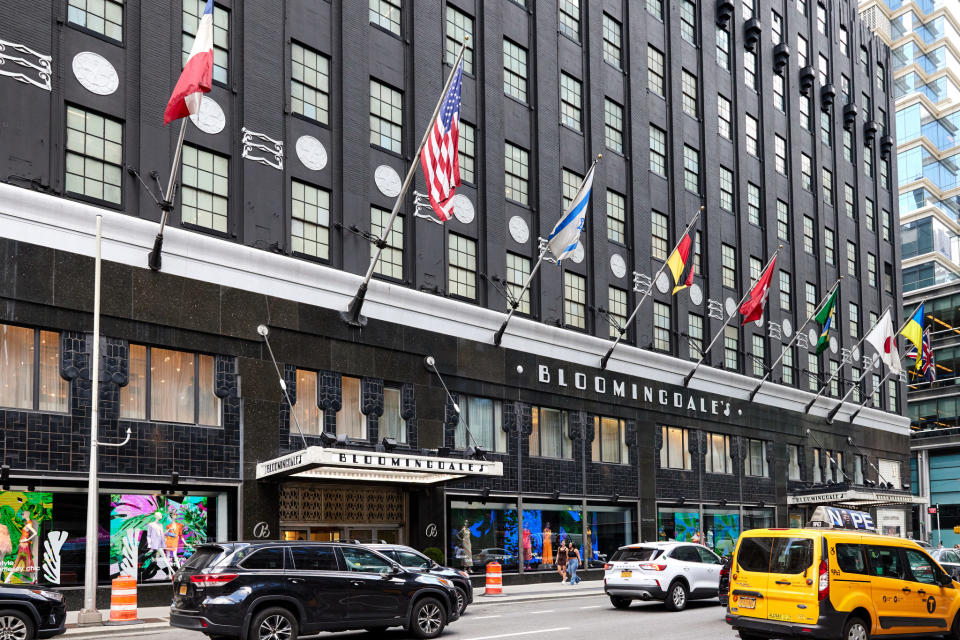Macy’s Future Up in the Air

With Macy’s Inc. now in play, additional bidders and higher offers are expected in the wake of Sunday’s report of a $21-a-share bid by Arkhouse and Brigade Capital Management.
Sources described the $21 bid, valued at $5.8 billion, as low, and offering a paltry premium, particularly with the stock spiking 19.4 percent, or $3.38, to $20.77 by the closing bell Monday.
More from WWD
Macy’s could be worth more since there’s better earnings potential in 2024, following this year’s improved inventory control, and the potential for new strategies, like the rollout of scaled-down, off-mall stores, simplified pricing, and private brand changes, starting to kick in next year when a soft landing of the economy is expected. The company is seeking to become less dependent on its traditional department store model and has been saddled with scores of locations losing relevance and starving for capital improvements.

If an extended bidding war develops, serious business disruption could ensue. Macy’s is highly vulnerable given its low stock price, its ongoing management transition whereby Jeff Gennette will retire as chairman and chief executive officer and will be succeeded by Tony Spring in February, and the fact that business has been soft this year.
“It’s not great timing for Macy’s. Tony does know the Macy’s business but it would have been better if he had been sitting at the top for awhile,” said a source. “Confronting an unsolicited takeover bid isn’t the best way for a new CEO to start his job.”
The Wall Street Journal on Sunday reported the bid for Macy’s. Macy’s and the bidders have declined comment.
Macy’s Inc.’s future is now up in the air. A new owner could decide to break up the group by selling off pieces of the business, such as Bloomingdale’s or Bluemercury, to more than recoup what was paid for the whole company. Past Macy’s Inc. managements have briefly considered selling off Bloomingdale’s, but it’s the crown jewel of the company and has been performing better than the Macy’s nameplate.
Also, attractive to potential buyers is Macy’s real estate, including stores, warehouses and parking lots, that could be sold off or redeveloped. The portfolio is concentrated on the East and West coasts and in better malls, but not in all cases. In several, a parking lot or part of a store building could be sold while Macy’s continues to maintain a viable retail business at the site.
Macy’s has done well selling off properties and still has much it could sell off or redevelop. Over a five-year period starting around 2017, the company raised $2 billion through real estate sell-offs, including shedding several prime downtown properties. TD Cowen, a division of TD Securities, in a report Monday placed Macy’s real estate value at between $7.5 billion and $11.6 billion.
As of Jan. 28, 2023, of Macy’s 566 locations, 302 were owned and 164 leased, 96 were subject to a ground lease, and four were partly owned and leased. Macy’s owns its flagship in San Francisco, but the city has been riddled with crime and an exodus of stores, making a deal there difficult.
Of Bloomingdale’s 57 locations, including department stores and outlets, 14 were owned and 37 were leased, while six had ground leases.
Bluemercury had 316 owned sites and 361 leased, 102 had ground leases and four were partially owned and leased.
The company recognized gains of $389 million in 2018 associated with sales of real estate, as compared to $544 million in 2017, and $178 million in 2018.
Among the real estate sold, the I. Magnin building in Union Square, San Francisco; Macy’s units in Brooklyn, Minneapolis, Seattle and Pittsburgh; the upper floors at the State Street, Chicago store, formerly the Marshall Field’s flagship, and the Macy’s site in Northbrook Court, Ill. A plan to redevelop the Herald Square flagship in Manhattan with a tower seems to have stalled.
“This deal isn’t going to happen at $21. Taking it private at $21 is ridiculous. Someone is going to have to take it to $24 or more,” said a financial source, who requested anonymity.
The timing of the offer is in certain ways strange, given how borrowing rates have gone up, making it more expensive to finance a deal and harder to come by the money.
According to one source in real estate, “A ton of development in the pipeline was pulled back, generally speaking. The best monetization is someone taking over a property and redeveloping it into something else. Given the market backdrop, it’s going to be less easy to blow out that real estate. I would say it becomes more of a ‘slow-burn’ strategy working to sell off property to developers, a four- or five-year strategy, not a 12- to 18-month process.
“Macy’s has got to be thinking about how high it can take the stock,” said the source, though, “I would think that Macy’s would like to give its new team a chance” to see how it develops new strategies and how the business performs next year, before a deal happens, said the source, noting that Macy’s just hired a new Bloomingdale’s CEO in Olivier Bron, a chief customer and digital officer, and a marketing executive. In response to bidders, the Macy’s board “could come back and say, ‘we have a better plan.'”

For the most part, retailers falling into private hands hasn’t been very successful. Belk is said to be having difficulties since being acquired by Sycamore Partners in 2015. Federated went bankrupt in 1990 two years after being bought by Campeau Corp., and Macy’s leveraged buyout in 1988 led to a bankruptcy. Eddie Lampert’s acquisition of Sears Holdings Corp. has been a long, slow demise of the group that also owns Kmart, with Lampert selling off real estate and other operations and never investing in the store fleet or merchandise.
“This bid at $21 is a fraction of the $70-a-share the company was worth at one time,” said one real estate source. “You would be buying an iconic retail company with enormous real estate. The problem is that Macy stores need massive capital. Many of the stores look dull. Target looks better, Walmart is upgrading. Everything at Macy’s, all the stores are cash-flow-positive with some of the weaker sites less so. Also, nobody wants ‘B’ mall real estate. Real estate is much less valuable today than it was. Macy’s is not about to give up Herald Square. The problem is if Macy’s or a new owner wanted to redevelop the site, it’s not easy. There is no office market [in New York] and Herald Square is not a residential market.”
There is a positive side to going private, said retail expert and former Morgan Stanley retail analyst Walter Loeb. “Macy’s could be more profitable. You can cut expenses, like paying dividends and board member salaries.
“I think the company has been looking forward to the ideas that Tony Spring might have for the company, and how he handles the company. But if there is a takeover, we may never see that.” Loeb added: “Bloomingdale’s and Bluemercury by themselves could be very attractive to investors.”
Around 2016, Macy’s began being pressured by activist shareholders to monetize real estate. “One of the chief criticisms was that Macy’s was acting like a caretaker, not a monetizer,” said a former retail executive. “Macy’s still is an owner of a lot of real estate so you have to believe that somebody seeking to acquire this business has to believe that they can unlock the value of that real estate.”
“Macy’s has also been on its own long-term journey to realize real estate value. Other value-creation opportunities could include monetization of Bloomingdale’s and Bluemercury,” Cowen pointed out in its report on Macy’s, released Monday.
“Being private could allow for more freedom, faster change and disassembly of Macy’s as we know it today — and a new owner would need to balance short- and long-term goals and objectives, which could involve Macy’s coming back to the public markets in a different form.”
Cowen indicated that the $21 price could be interpreted as “attractive given credit card income risk, negative sales trends, ongoing store transformation, and the need for younger customers” at Macy’s.
Obstacles for a deal, Cowen added, include shareholder approval, necessary funding, and higher interest rates. “Note prior takeout bids at Nordstrom and Kohl’s were unsuccessful, but we believe this instance has the potential to be more credible if financing is indeed lined up and the buyers have ample experience in retail.”
Best of WWD

